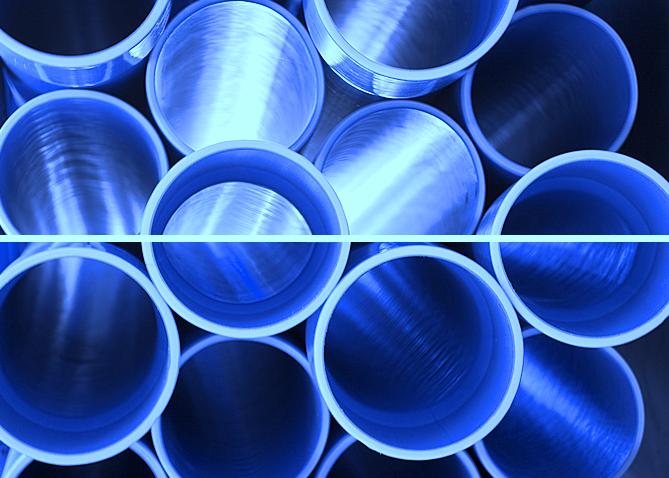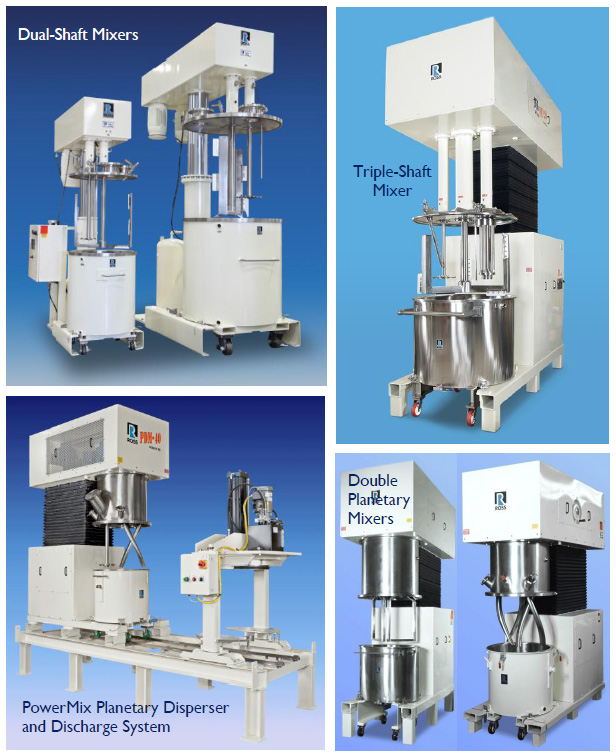Tech Report
Recommended Mixing Equipment for Glass Fiber-Reinforced Epoxy Composites

Application Summary
Epoxy resins reinforced with glass fibers result in a lightweight composite that is highly resistant to mechanical and chemical wear. One critical production step is the dispersion of chopped glass fibers into the resin. Precise and thorough mixing is necessary to loosen the bundles of fiber and coat individual fibers with polymer without damaging them.
The physical properties of the finished composite are dependent not only on the characteristics of the glass fiber, resin and other components present but also on the degree of mixedness. Mixer selection is based on a number of factors but primarily viscosity profile and shear input.
Ross Multi-Shaft Mixers and Planetary Mixers
Ross Multi-Shaft Mixers are well-proven in the manufacture of fiber-reinforced epoxy composites. Equipped with two or more independently-driven agitators working in tandem, Multi-Shaft Mixers deliver a robust combination of high shear agitation and laminar bulk flow over a wide viscosity range: from water-like to several hundred thousand centipoise.
The most economical design is the Dual-Shaft Mixer which features a low-speed anchor and a high-speed saw-tooth disperser blade. One practical method is to charge the liquids and glass fibers into the mix vessel and establish vacuum before running the agitators. Other fillers and additives introduced later in the mixing process may also be added in a similar manner so that any air present in the raw materials is removed and prevented from being micronized. During mixing, the operator visually examines the batch through glass sight ports and makes necessary adjustments to the individual speed of each agitator as the product increases in viscosity and/or temperature. Once all solid components are wetted out, the mixer is stopped for a quick scrape-down of surfaces above the product level. The batch is then mixed again under vacuum to eliminate any remaining air bubbles that could show up as voids in the molded part. The finished product is either discharged by gravity or pressed out of the vessel by a platen-style Discharge System. The latter method allows for fast and efficient transfer of viscous or sticky materials while reducing waste and clean-up.
Epoxy composites that undergo very high viscosity peaks (above 1 million cP) during processing are better prepared in Planetary Dispersers and Double Planetary Mixers. These machines consist of two or more blades which rotate on their respective axes as they revolve around the mix vessel. Unlike agitators which rotate from a fixed axis, the blades in a planetary-style mixer continually advance into the batch and fresh product all the time.
Combining slow-speed planetary agitation with an orbiting high-speed disperser, the Ross PowerMix Planetary Disperser quickly incorporates solids into a thick liquid base. Each agitator is independently controlled so flow patterns and shear rates are easily fine-tuned with every change in product rheology. The classic Double Planetary Mixer, on the other hand, features two identical stirrers that move at relatively low speeds and impart increasing levels of shear as the batch gains considerable viscosity. Helical High Viscosity "HV" Blades (US Patent No. 6,652,137) offered on Ross Double Planetary Mixers work by kneading the product in a forward and downward motion. This makes them ideal for processing highly filled materials up to 6 million cP that would otherwise climb up a vertical stirrer. Testing is normally recommended to confirm the best mixing strategy and equipment for a particular formulation.
Other applications of Ross Multi-Shaft Mixers and Planetary Mixers:
- Battery Slurries
- Ceramic Dispersions
- Conductive Inks
- Cosmetic Creams
- Dental Composites
- Energetics
- Filled Epoxies
- Fuel Cell Pastes
- Gum Dispersions
- Lubricants
- Medical Gels
- Metal Suspensions
- Molding Compounds
- Pharmaceutical Pastes
- Plastisols
- RTV Sealants
- Silicones
- Solder Pastes
- Syntactic Foams
- Thermal Greases
- Thick Film Inks
- Viscous Foods
